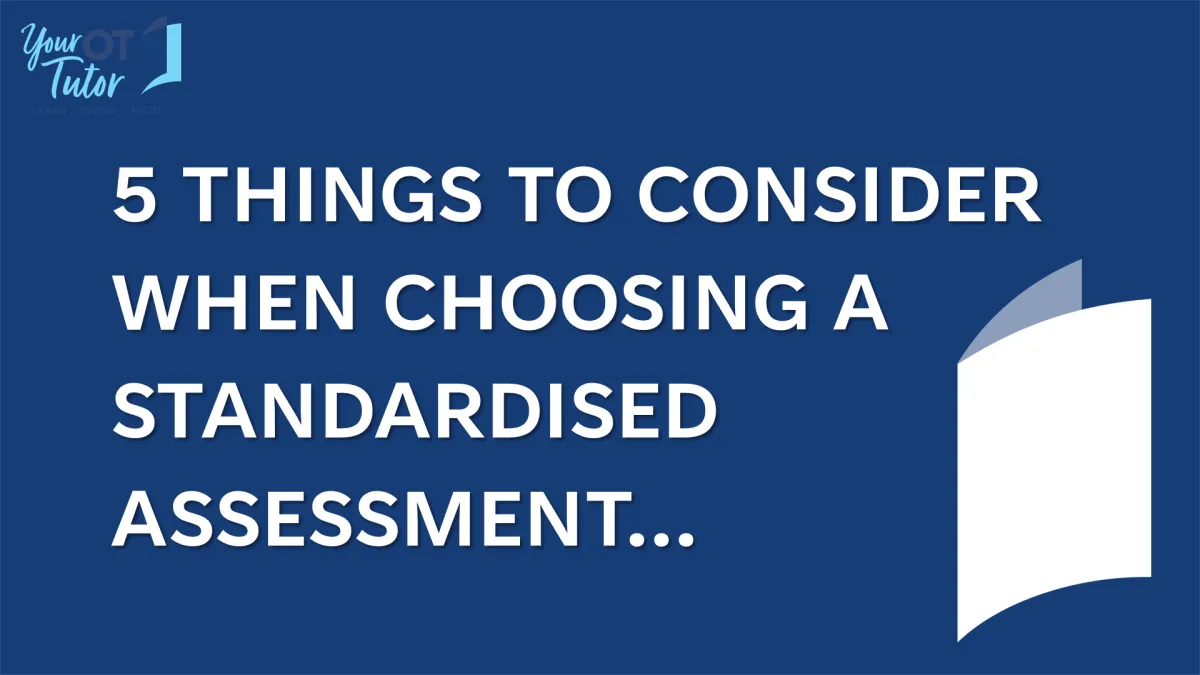THE YOUR OT TUTOR BLOG
Articles on important topics for occupational therapists...


5 THINGS TO CONSIDER WHEN CHOOSING A STANDARDISED ASSESSMENT…
Do you sometimes get overwhelmed trying to decide what standardised assessments to use in your clinical practice – or whether to use them at all? These 5 considerations may help!
1. Consider the purpose – what are you trying to achieve?
Using standardised assessments can be very beneficial for lots of reasons, but keep in mind what you are trying to achieve when choosing a tool. If the primary purpose is to gather general information, your client may find it easier to provide this in a non-standardised interview, however, if your client has difficulty expressing their thoughts, a standardised assessment may provide you with a systematic approach for them to find the words they need. Sometimes the purpose is to track a client’s progress during therapy, in other words, to use it as an ‘outcome measure’. If this is the purpose, make sure it has enough sensitivity to pick up subtle improvements and that reliability between assessors is good if another clinician will complete the follow-up assessment. Standardised assessments are also helpful if you need to present information in objective numbers, with cut-off scores and norms that you can compare to – medical teams love to know cognitive screening scores, while NDIS staff look for WHODAS scores! While standardised assessment results can’t fully replace the valuable information we can often gather from non-standardised interviews and functional assessments, sometimes objective scores can add strength to the recommendations we make.
2. Is it appropriate for your client’s demographics?
Don’t just google “assessment for people with mental health conditions” or similar and choose the first assessment that comes up. Consider whether the tool is appropriate for the client’s age, such as is it appropriate for adolescents, adults, or older adults, or do you need a different version? Also consider if it has been tested for use with your client’s particular condition. For example, has it only been tested on people who have experienced a stroke, but there is no research evidence about whether it gives reliable results for people with spinal cord injuries? To find this out, you may need to go further than a quick google search and actually look for journal articles about the tool’s validity or reliability, which is known as the psychometric properties of the tool. This includes things like, does it test what it claims to test, or are the results reliable between different administrators?
3. Does it have good clinical utility?
Clinical utility is all about how easy the assessment tool is to use in practice. This includes things like how long it takes to setup, administer and score, and whether it would be something the client would be happy to participate in. If it requires a full kit of items to administer, or the scoring system needs a calculator and spreadsheet to work out, it will probably seem like it’s not worth the effort in a busy clinical environment. The time to administer the assessment needs to consider the client’s fatigue levels – will they be able to complete it in one session, or are their physical or cognitive fatigue levels too high? Also consider if the client will find the ‘test-like’ scenario stressful, and whether it would be possible to gather the same information with a different tool or even a non-standardised assessment approach.
4. Is it freely available or does it cost money to purchase or administer?
Depending on your workplace, it may be a measure that you use every day, with a number of clients, so it is worth the investment to purchase the tool. But if it requires a full, expensive kit, and isn’t something that you will necessarily use more than a couple of times each year, it may not be financially possible to use that tool, even if it ticks all the other boxes for what you are looking for in a standardised assessment. It may be that you need to go to your second choice, that will still be appropriate for the client, but is freely available.
5. Do you need to be trained or accredited to administer it?
This is particularly important to consider if tools are available within your office but not everyone is trained or accredited to use them. Some tools may only require you to read through a script or brief administration guidelines, others may have a long manual, while others may require you to undergo formal training and a test before you can be accredited to use them; common examples that require accreditation include the Functional Independence Measure (FIM) and Montreal Cognitive Assessment (MoCA). If the tool is available within your workplace, you may think “what are the chances they’ll find out I’m not accredited anyway?”, but it is not a good move to just use it anyway. Nowadays any OT report or documentation could be scrutinised by lawyers, so you need to be confident you can stand by what you have written. It is also just important for your professional integrity and ethical practice to only provide services you are competent to provide.
Extra Tip: There are some websites that have done some of this work for you by collating the research evidence, such as Shirley Ryan Labs (https://www.sralab.org/rehabilitation-measures), and Physiopedia Outcome Measures (https://www.physio-pedia.com/Outcome_Measures), so these may be a good starting place to find out information about standardised assessments you are considering.
If you found this blog helpful, then sign-up to the Your OT Tutor mailing list to be notified when new resources, courses, and blogs are available. In the coming weeks there will be a mini-course about choosing standardised assessments to use in Functional Capacity Assessments for adults!






